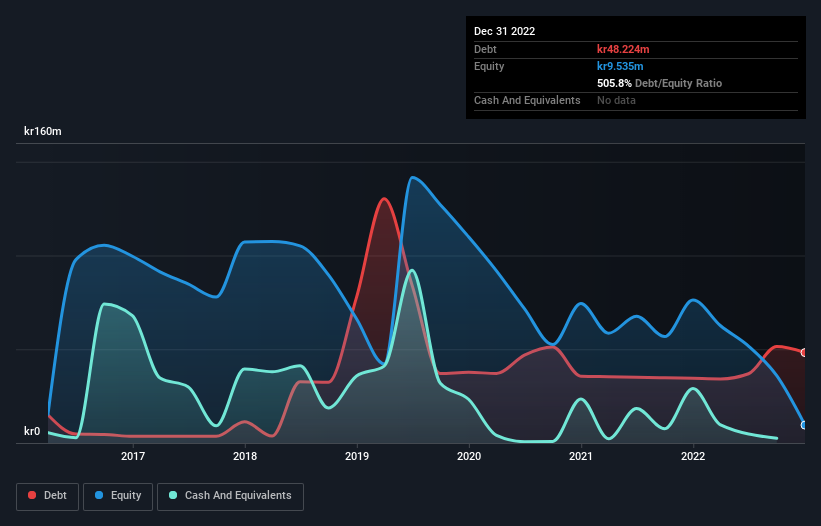
David Iben put it well when he said, 'Volatility is not a risk we care about. What we care about is avoiding the permanent loss of capital.' It's only natural to consider a company's balance sheet when you examine how risky it is, since debt is often involved when a business collapses. As with many other companies Alelion Energy Systems AB (publ) (STO:ALELIO) makes use of debt. But the more important question is: how much risk is that debt creating?
Why Does Debt Bring Risk?
Generally speaking, debt only becomes a real problem when a company can't easily pay it off, either by raising capital or with its own cash flow. Part and parcel of capitalism is the process of 'creative destruction' where failed businesses are mercilessly liquidated by their bankers. While that is not too common, we often do see indebted companies permanently diluting shareholders because lenders force them to raise capital at a distressed price. Of course, the upside of debt is that it often represents cheap capital, especially when it replaces dilution in a company with the ability to reinvest at high rates of return. The first thing to do when considering how much debt a business uses is to look at its cash and debt together.
Check out our latest analysis for Alelion Energy Systems
How Much Debt Does Alelion Energy Systems Carry?
You can click the graphic below for the historical numbers, but it shows that as of December 2022 Alelion Energy Systems had kr48.2m of debt, an increase on kr34.5m, over one year. However, it also had kr2.53m in cash, and so its net debt is kr45.7m.

How Strong Is Alelion Energy Systems' Balance Sheet?
According to the last reported balance sheet, Alelion Energy Systems had liabilities of kr38.9m due within 12 months, and liabilities of kr50.9m due beyond 12 months. Offsetting these obligations, it had cash of kr2.53m as well as receivables valued at kr8.13m due within 12 months. So its liabilities total kr79.1m more than the combination of its cash and short-term receivables.
This deficit is considerable relative to its market capitalization of kr129.7m, so it does suggest shareholders should keep an eye on Alelion Energy Systems' use of debt. This suggests shareholders would be heavily diluted if the company needed to shore up its balance sheet in a hurry. The balance sheet is clearly the area to focus on when you are analysing debt. But ultimately the future profitability of the business will decide if Alelion Energy Systems can strengthen its balance sheet over time. So if you're focused on the future you can check out this free report showing analyst profit forecasts.
Over 12 months, Alelion Energy Systems reported revenue of kr80m, which is a gain of 44%, although it did not report any earnings before interest and tax. Shareholders probably have their fingers crossed that it can grow its way to profits.
Caveat Emptor
While we can certainly appreciate Alelion Energy Systems's revenue growth, its earnings before interest and tax (EBIT) loss is not ideal. Indeed, it lost a very considerable kr65m at the EBIT level. Considering that alongside the liabilities mentioned above does not give us much confidence that company should be using so much debt. Quite frankly we think the balance sheet is far from match-fit, although it could be improved with time. Another cause for caution is that is bled kr61m in negative free cash flow over the last twelve months. So suffice it to say we consider the stock very risky. When analysing debt levels, the balance sheet is the obvious place to start. But ultimately, every company can contain risks that exist outside of the balance sheet. For instance, we've identified 4 warning signs for Alelion Energy Systems (1 is a bit concerning) you should be aware of.
If you're interested in investing in businesses that can grow profits without the burden of debt, then check out this free list of growing businesses that have net cash on the balance sheet.
New: Manage All Your Stock Portfolios in One Place
We've created the ultimate portfolio companion for stock investors, and it's free.
• Connect an unlimited number of Portfolios and see your total in one currency
• Be alerted to new Warning Signs or Risks via email or mobile
• Track the Fair Value of your stocks
Have feedback on this article? Concerned about the content? Get in touch with us directly. Alternatively, email editorial-team (at) simplywallst.com.
This article by Simply Wall St is general in nature. We provide commentary based on historical data and analyst forecasts only using an unbiased methodology and our articles are not intended to be financial advice. It does not constitute a recommendation to buy or sell any stock, and does not take account of your objectives, or your financial situation. We aim to bring you long-term focused analysis driven by fundamental data. Note that our analysis may not factor in the latest price-sensitive company announcements or qualitative material. Simply Wall St has no position in any stocks mentioned.
About OM:ALELIO
Alelion Energy Systems
Alelion Energy Systems AB (publ) engages in the development, manufacture, and sale of lithium-ion battery systems to industrial customers in Sweden.
High growth potential and fair value.
Market Insights
Community Narratives



